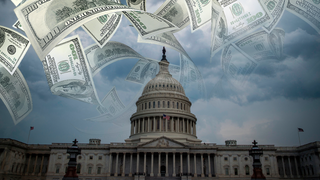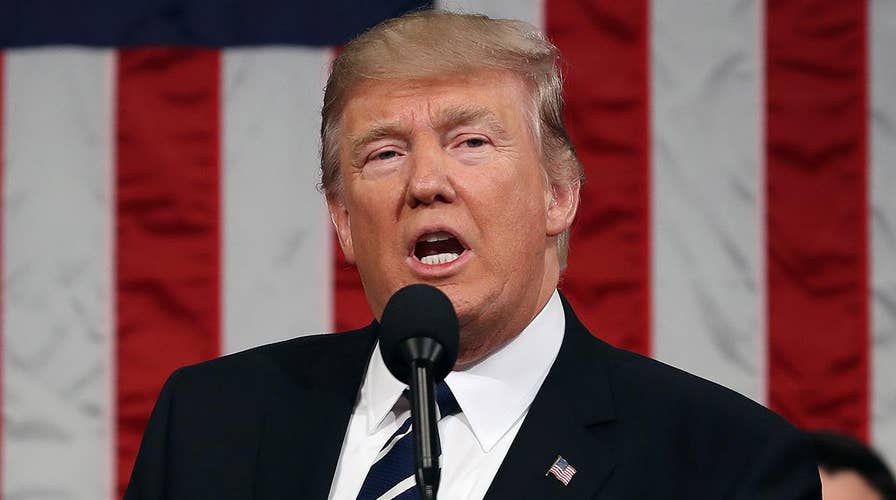Trump puts pressure on Congress to repeal, replace ObamaCare
Joe Borelli and Capri Cafaro weigh in
President Trump, after a rocky few weeks marked by scuffles with the media and staffing turmoil, emerged from his lofty address to a joint session of Congress winning praise from both sides of the aisle – signaling what could be a fleeting opportunity for the president to reclaim momentum for his agenda.
“THANK YOU!” he tweeted Wednesday morning, no doubt seeing the generally positive coverage of his address. The White House will now let lawmakers and voters digest a speech that was markedly more optimistic than his at-times gloomy inaugural, even pushing off a planned signing of Trump’s revised executive order on immigration until later in the week.
“I thought that was a bold, positive speech,” said Texas Sen. Ted Cruz, a fierce Trump rival in the 2016 GOP primary. “My number one priority in the Senate has always been jobs and economic growth. That’s why I was so energized by President Trump’s speech.”
The sentiment was echoed by top GOP lawmakers. House Speaker Paul Ryan, another leader occasionally at odds with the president during the campaign, called it a “home run.”
The positive response already was being reflected in the markets. The Dow Jones Industrial Average crossed the 21,000 milestone at the opening bell Wednesday morning in what was the fastest 1,000-point advance in the blue-chip index’s history. This was after Trump called again for repealing ObamaCare, overhauling the tax code and advancing a $1 trillion infrastructure plan.
As with his campaign promises, the ambitious agenda laid out in Tuesday’s speech will soon meet with the challenging realities of legislating. While Republicans have control of Congress, lawmakers have yet to advance legislation on top goals including tax reform and ObamaCare repeal.
But Trump set markers for Congress in his speech last night, without necessarily explaining how to get there. He urged Congress to replace ObamaCare “with reforms that expand choice, increase access, lower costs, and at the same time, provide better health care.”
He outlined “principles” to guide negotiations, including a call for Americans with pre-existing coverage to keep access to care, for states to have “flexibility” with Medicaid, and for Americans to be able to buy insurance across state lines.
'A new chapter of American greatness is now beginning'
He also said his team is developing “historic tax reform that will reduce the tax rate on our companies so they can compete and thrive anywhere and with anyone.” He vowed a “big, big cut” including “massive tax relief for the middle class.”
Trump called, too, for a “national rebuilding,” urging Congress to pass legislation that produces a $1 trillion public-private investment in infrastructure.
Twitter reported that a record 3 million tweets were sent about Trump's speech.
The top tweeted moment was the Republican's call to repeal and replace the Affordable Care Act. That was followed by Trump's salute to Carryn Owens, the widow of Senior Chief William "Ryan" Owens, who was killed last month in Yemen.
The Twitter numbers make it the most tweeted speech by a president to Congress in the relatively short history of the platform. The previous mark was 2.6 million tweets for President Barack Obama's State of the Union address in 2015. That speech had included a highly-tweetable moment, when Obama chided Republicans, who applauded the fact that he had no more political campaigns to run. Obama reminded them that he won both of his presidential runs.
Trump for the most part traded the contentious and punchy tone of the last few weeks for loftier – some might say more presidential – rhetoric Tuesday night. Declaring “the time for small thinking is over,” Trump appealed to the country to “believe, once more, in America.”
“A new chapter of American greatness is now beginning. A new national pride is sweeping across our nation,” he said. “And a new surge of optimism is placing impossible dreams firmly within our grasp.”
And as he did during the presidential campaign, he pushed a nationalist message, making big promises for what will happen when America puts its citizens first: “Dying industries will come roaring back to life. … Crumbling infrastructure will be replaced with new roads, bridges, tunnels, airports and railways gleaming across our very, very beautiful land. … Above all else, we will keep our promises to the American people.”
He said his job is to represent the United States, not the world.
He also defended his stepped-up deportations and other border security plans, casting his immigration agenda as part of the broader economic plan. By enforcing immigration laws, he said, “we will raise wages, help the unemployed, save billions and billions of dollars, and make our communities safer for everyone.” He joined GOP lawmakers seeking reforms to legal immigration – and potentially reopened the broader debate in Congress by saying immigration reform is possible.
Trump's first official status report to Congress came amid a fast-paced opening volley of activity at the start of his term: a slew of executive actions, a forthcoming budget proposal and various side-deals with American companies aimed at creating jobs. Trump was eager to highlight those accomplishments, but also faces early challenges: an order suspending refugee and other admissions on hold by the courts, questions about his team’s contacts with Russia and a Congress that has not yet moved legislation on key priorities.
The Associated Press contributed to this report.













































